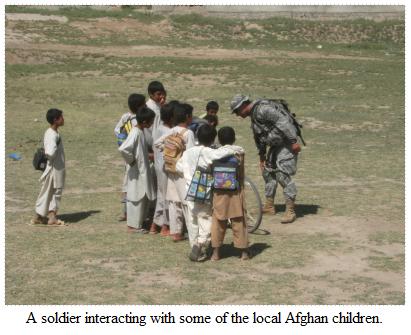
|
Sailor's Story:
Afghan Police Training (Part 2)
Nov. 4, 2008
As I stated in my previous article, the first half of the FDD process
is a more structured program compared to the second half. There are a number of
challenges throughout FDD, but the last three phases have proven to take
considerably more time and effort by the Police Mentor Teams. The third phase
ended with the Afghan recruits attending and completing their two month training
program at their From this point on, the Afghans have finished their initial training and can now be considered legitimate police officers. Phase IV of FDD is the redeployment of the ANP (movement back into districts). Once the Afghans and their mentors begin their trip back to their respective districts, the challenges of mentoring in a war zone become very apparent. The basic task of moving personnel across this country is extremely dangerous. The Afghan and PMT convoys have become ever increasing targets of opportunity for insurgents in the area. These Afghan policemen symbolize the future success of this country. The insurgents know this and make it their mission to stop all progress here. In addition to targeting these Police convoys, insurgents also love to target vulnerable logistical convoys. It takes large amounts of supplies to prepare these teams for their continued mentorship and the only way to transport most of these supplies to the districts is through large ground movements. Many Afghan truck drivers have flat out refused to take shipments into certain regions of the country based solely on the high probability of being attacked. Transporting supplies is just one more example of the challenges involved in Focused District Development. Luckily we have managed to find ways to make it work with the cooperation of the local Afghans. In my opinion, the fifth phase of FDD is probably the most important stage in the program. Once the police and mentor teams are back in district, they begin the focused mentoring and validation phase. It is during this phase that the police mentors interact with the Afghans on a daily basis. Relationships are built from the very beginning of this phase and the two entities (Afghans and Mentors) become a team focused on developing a sustainable police force. Senior Mentors are paired with Afghan district police chiefs and junior enlisted soldiers are tasked with training patrolmen and senior non-commissioned officers. Afghans learn the techniques of foot patrols, advanced marksmanship, criminal investigation, building relationships with the locals, drug eradication, and gaining the support of the entire community in order to root out terrorists in the region. The metric used to track the progress of these police forces through FDD is the Capability and Milestone (CM) level. When police units begin phase V of FDD they are at CM level 3. Each month the police mentor teams complete Capabilities Endorsements that track the training progress in a variety of categories. Here in the Police Advisory Cell office at Camp Phoenix, we receive these monthly CE reports and submit this information to higher command that further explains the current CM levels for each district and their “get well” plans to reach CM level 1. Once a district reaches CM level 1, the FDD process shifts to the sixth and final phase: the over watch and sustainment training phase. The initial development of the FDD process allowed for the Police Mentor teams in a CM level 1 district to actually “uncover” and move on to a new district in the beginning stages of FDD. Once again, this is where the plan has been modified due to working in an extremely dangerous area. Most local leaders in CM level 1 districts are worried about the state of security once the coalition soldiers leave the area. They have seen so many years of corruption throughout the Afghan police that they still have trouble placing faith in the abilities of their newly reformed policeman. The coalition leaders are currently developing programs to help with the over watch phase so that the current level of security is not immediately destroyed once the mentors leave. In a way, it is a micro level exit strategy for each district. Once the people feel confident in the police and the pertinent level of continued validation is developed, the FDD process can continue on to further cycles and a greater number of districts can be reformed within those new cycles. This is where the FDD process is at currently.
In my opinion, the only thing holding this program back from making major
progress is the level of Police Mentor Teams in the country.
There is no doubt that we need more troops in
This is a program that has been developed, refined, and scrutinized a great
deal over the last 18 months, and I believe it is the right way to conduct this
operation. I have all the respect in the world for the
soldiers assigned to Police Mentor teams and Embedded Training Teams (teams
assigned to mentor the Afghan Army). These men and women are
in the middle of war zones working along side Afghans who they must put full
faith in without any prior relationship. These programs are
not without fault. Twice in the last month, Afghan policeman
turned against their mentors and killed two I hope that this article has given everyone back home a clearer picture
of what it means to “rebuild” and help develop self-sustaining forces in LTJG Petrosky 10/31/2025Comments? All programming and design work by WAM Computers 211 N. State Litchfield, IL 62056 (217)324-6926 Best viewed with Download for free! |

|





